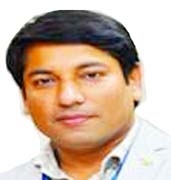
Alaul Alam :
The sudden demise of the noted folklorist Shamsuzzaman Khan who expired on 14 April, 2021 at the age of 81 has created an irreparable loss in the arena of folkloric research and literatures. This noted folklorist was born on December 29, 1940, in Manikganj district. He began his career as a teacher but he earned huge fame in the national and international arena as a prolific writer and researcher.
It is no denial that folklore got a new release of life in Bangladesh with Shamsuzzaman Khan at the helm of the Folklore Department in Bangla Academy in 1981. It is he who realized first that without international relation or communication, the study of folklore is almost impossible. He was a dynamic person who relentlessly worked to enrich the folk cultures of Bangladesh and at the same time tried to make them acquainted with the world people.
It is true that prior to Shamsuzzaman Khan, there were some scholars who devoted themselves to smooth the path of folklore study in the country but their approaches were mostly either linguistic or literature-oriented.In most cases, the first trend of folklore study was confined to the literature without objective analysis which did not convey much significance in enriching our folklore.
Shamsuzzaman Khan realized the necessity of analyzing our folklore in the objective way and in this regard, he experimented folklore following the second trend, where the main focus remains on the application of international and up to date theories to the analysis of the indigenous data and their empirical study. In his observation, he found that the world folklore is being practiced following two recognized methods. One is diachronic and the other is synchronic approach.
Shamsuzzaman pointed out that most scholars in our country do not want to realize the importance of folklore, rather they always try to neglect it from their own points of views. But they do not know, folklore is the main component of our culture. Folklore is related to language and literature. Similarly, it is closely related to the analysis of history, society culture, tradition, music, etc. So, to enrich our tradition and culture, folkloric knowledge cannot be ignored.
Shamsuzzaman asked the so called scholars that without a pure knowledge on folklore how can a researcher in the social science be fit to ensure quality research with a proper objective analysis? Though our universities are indifferent to open folklore department but with his own initiatives, some public universities have created scopes for students to study folklore.
Like many world renowned folklorists, he asserted firmly that folk should not be automatically identified with peasant or rural groups, or with people from the past, rather it is constantly being created and recreated to suit new situations. Folklore happens everywhere because everyone experiences and feels it differently and in this way, the study of folklore broadens our horizons of consciousness.
Shamsuzzaman Khan was currently the president of Bangla Academy. He succeeded National Professor Anisuzzaman, who served as President of Bangla Academy since 2012 till his demise. Prior to this, he served as Director General of Bangla Academy for 10 years. He is renowned for editing a book series on folk culture of 64 different districts in 64 volumes, and collections of folklore series in 114 volumes.
Not only that, he wrote and edited more than a hundred books including “Folklore Charcha”, “Bangabandhur Rastrochinta O Bartaman Bangladesh”, “Muktobhuddhi, Dharmaniropekkhata O Samakal”, “Rangaroser Galpasamgra”, “Bangladesher Utsab”, “Bangla Shon O Panjika” and “Folklore Chinta”
He was awarded Bangla Academy Literary Award in 2001, Ekushey Padak in 2009, and Independence Day Award in 2017 for his scholarly contributions to the nation. His contributions to the study of folklore in Bangladesh can never be described in words or writings. His ideology and thinking towards folklore study in Bangladesh are so vast and authentic as well as scientific, for which the people of Bangladesh will always owe to him.
We are deeply saddened for his hasty demise. With his demise our folkloric world has lost a great soul devoted to uplifting our folklore to the world community. Finally, with a quotation from T.S Eliot I would say “Do I dare disturb the universe?” As we have no choices but to accept the dire reality. I pray for the eternal peace of his departed soul and convey deep sympathy to the bereaved family.
(Alaul Alam teaches at Prime University& research scholar at the IBS. Email: [email protected])

